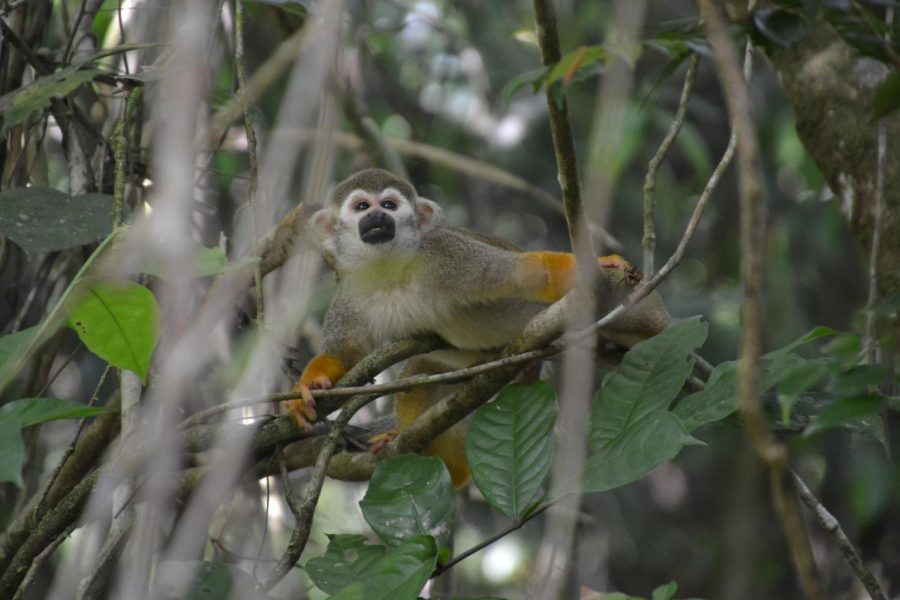Anita Stone’s squirrel monkey research to continue this summer
Photo Contributed by Anita Stone
Associate professor of biology Anita Stone, who has a doctorate in ecology & evolutionary biology, continues her research funded by a $307,486 grant from the National Science Foundation.
March 14, 2023
In May of 2022, associate professor of biology Anita Stone, who has a doctorate in ecology & evolutionary biology, received a $307,486 grant from the National Science Foundation. Since receiving the grant, Stone has been able to obtain resources allowing her to further her research on squirrel monkeys.
Each summer, Stone takes students to Brazil for eight weeks to study and collect behavioral data on squirrel monkeys in the eastern Amazonian forest. In November, while in Brazil, Stone said she captured the monkeys, put collars on them to keep track of them. and collected blood samples for genetic testing and tissue samples, which is something they didn’t have the resources for before the grant. Following this, she said she sends the samples to her collaborators and they look for different genes within males. Stone said that the grant is a collaboration between her, a researcher at UCLA, and a researcher in Texas, which enables them to integrate lab work and genetics with the behavioral findings from the field.
“We’re really integrating to look at this from all angles, so we’re looking at behavior, we’re doing field stuff, and then we’re also doing genetic lab stuff. I think that is a novel approach to look at this. It’s not often done with squirrel monkeys and primates,” Stone said.
Stone said the grant has allowed her to focus on the interactions between males and females and their mating system.
“During that mating season, the males, they poof up. There’s no better way for me to describe it,” Stone said.
Stone said the entire goal of the research is to find out why this happens. She said that in an ecological evolutionary sense, they are trying to figure out the function behind the male monkey’s seasonal enlargement.
“This research is extremely important for us to expand our knowledge on this specific species, as there is sparse research on the squirrel monkey.” Amy Wilkerson, a former California Lutheran University student who went with Stone to Brazil last summer, said in an email interview. “It is also important to give students like me access to research in the field and mentorship in that experience to continue to grow and learn in the scientific field.”
Stone said she can now take three students instead of one or two because of the grant, which made it possible for students to go on the trip fully covered and receive a stipend.
Natalie Miller, a junior at Cal Lutheran, said in an email interview that she was chosen to go to Brazil with Stone and two other students this upcoming summer.
“This research is covering something that has not been studied in squirrel monkeys, and yet is a super interesting phenomenon. What we discover will improve a general understanding of squirrel monkeys, as well as other scientists’ future studies and questions,” Miller said.
Stone, born and raised in Brazil, said she has been studying squirrel monkeys for 22 years and her research started while she was in graduate school.
“I was on a trip with my graduate advisor…and I saw my first group of squirrel monkeys and I was like okay this is it,” Stone said.
At the end of her dissertation, Stone said she wasn’t sure if she would continue her studies with squirrel monkeys, but since she had so many more questions, she decided to keep studying. She said it is both the monkeys and the people that keep her going back.
“I think part of the appeal is that it is a country that I grew up in and I know, but also I think what keeps me going back is everybody involved, like the monkeys and the people…I feel like I know those groups of monkeys and I know that community of people and I think that really inspires me,” Stone said.
With the trip to Brazil just months away, Miller said she is starting to get excited about her upcoming experience.
“I am hoping to learn as much as we can about our research question, the monkeys’ behavior, how this kind of research is conducted in the field, and about Brazilian culture,” Miller said.
Stone said that when the group is not doing research, they have the chance to immerse themselves in the Brazilian culture and community. She said they watch soccer games and attend festivals in the village.
“The trip to Brazil allowed me to fully immerse myself in Brazilian culture and lifestyle. While conducting the research we lived with the family of one of the field guides, Ed. They introduced us to the Brazilian lifestyle through food, soccer matches and community events such as music festivals and traditional celebrations,” Wilkerson said.
Stone said that doing this with the students has a large impact on her.
“Another thing that inspires me is, you know, I could go every summer by myself, right, and just do projects…but the students are a big inspiration for me to go…Every time I go with a new student it’s like I’m seeing it new for the first time,” Stone said.
This article was updated at 8:35 a.m. on March 14 to correct that the students that Stone brings to Brazil only collect behavioral data during the summer and to clarify that Stone captures the monkeys, puts the collars on them and collects blood samples.




















